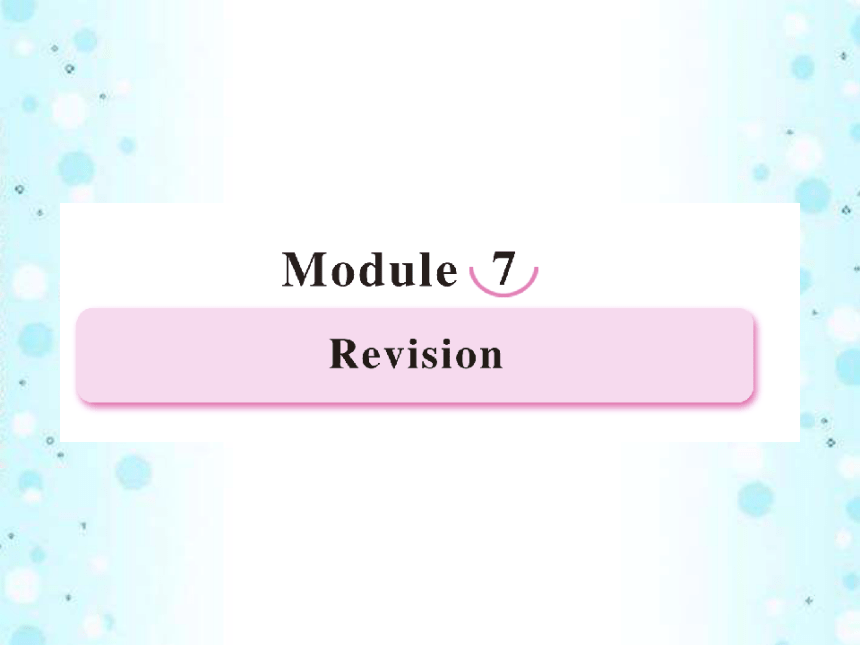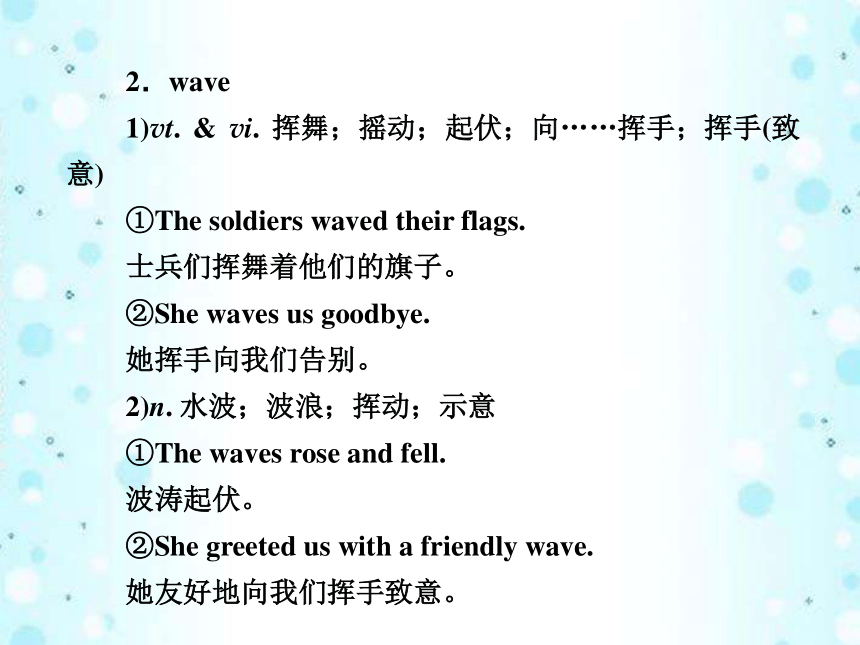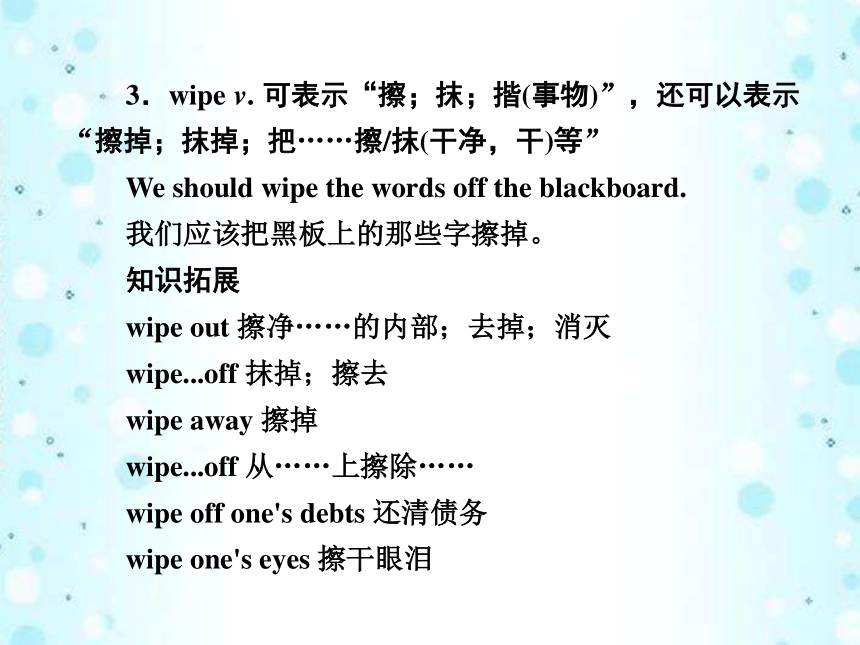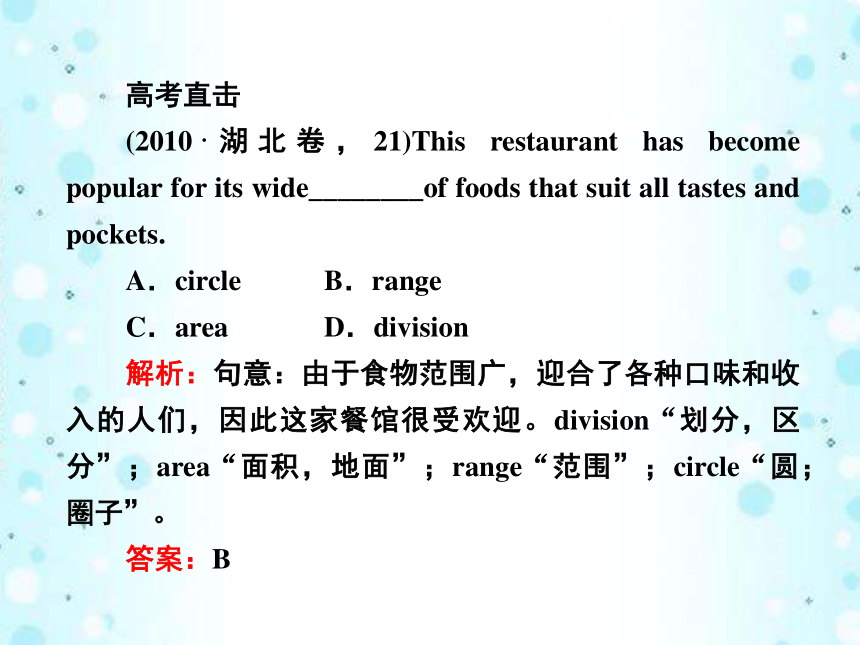高中英语 Module7 Revision同步课件 外研版必修4
文档属性
| 名称 | 高中英语 Module7 Revision同步课件 外研版必修4 |

|
|
| 格式 | zip | ||
| 文件大小 | 151.4KB | ||
| 资源类型 | 教案 | ||
| 版本资源 | 外研版 | ||
| 科目 | 英语 | ||
| 更新时间 | 2014-09-16 00:00:00 | ||
图片预览












文档简介
课件35张PPT。1.mix vt. & vi. 混合;掺和;相处
mixture 混合物
mix up 弄乱;搅匀;混淆
mixed 各种各样的
mix...with 把……和……掺在一起
mix...and 掺和
①We should not mix black with white.
我们不能混淆黑白。
②Water and oil will not mix.
油和水不相容。即学即用
I' m afraid you mixed her up________her sister.
A.with B.for
C.as D.like
答案:A2.wave
1)vt. & vi. 挥舞;摇动;起伏;向……挥手;挥手(致意)
①The soldiers waved their flags.
士兵们挥舞着他们的旗子。
②She waves us goodbye.
她挥手向我们告别。
2)n. 水波;波浪;挥动;示意
①The waves rose and fell.
波涛起伏。
②She greeted us with a friendly wave.
她友好地向我们挥手致意。知识拓展
long/short wave 长/短波
sound/light/electric waves 声/光/光波
wave one's hand at sb. 向某人挥手
wave to/at sb. 向某人挥手致意
make waves 兴风作浪即学即用
He________his girlfriend goodbye.
A.said B.waved
C.shook D.saw
答案:B3.wipe v. 可表示“擦;抹;揩(事物)”,还可以表示“擦掉;抹掉;把……擦/抹(干净,干)等”
We should wipe the words off the blackboard.
我们应该把黑板上的那些字擦掉。
知识拓展
wipe out 擦净……的内部;去掉;消灭
wipe...off 抹掉;擦去
wipe away 擦掉
wipe...off 从……上擦除……
wipe off one's debts 还清债务
wipe one's eyes 擦干眼泪
即学即用
根据汉语提示完成句子。
(1)She is________the sweat________her face.
她正在擦掉脸上的汗水。
(2)Could you________the basin________?
把洗脸盆里面弄干净好吗?
答案:(1)wiping, off (2)wipe, out4.range
1)vi. (在一定范围内)变化;涉及;分布
The ages of the children range from 11 to 19 years old.
这些孩子的年龄从11岁到19岁不等。
2)vt. 排列;分类
You had better range the books by size.
你最好按书的大小排列好。
3)n. 范围;程度;射程
What is the range of your gun?
你的枪的射程有多远。高考直击
(2010·湖北卷,21)This restaurant has become popular for its wide________of foods that suit all tastes and pockets.
A.circle B.range
C.area D.division
解析:句意:由于食物范围广,迎合了各种口味和收入的人们,因此这家餐馆很受欢迎。division“划分,区分”;area“面积,地面”;range“范围”;circle“圆;圈子”。
答案:B即学即用
The prices of beer________from 50 cents to $ 4 per little during the summer season.
A.altered B.ranged
C.separated D.differed
答案:B5.design
1)v. 设计;打算;企图;目的是……(常用于被动结构)
①The room was originally designed to be my study.
这间房间原预定是做我的书房的。
②This party was designed to celebrate his birthday.
这次晚会的目的是庆祝他的生日。
2)n. 设计;企图;图案
Her latest design won the first prize in the contest.
她最新的设计在比赛中获得了一等奖。知识拓展
by design 故意地;蓄意地
have designed on... 对……抱不良企图
design sb. for 打算让某人从事(某种职业)
design sb. to be 打算让某人从事(某种职业)即学即用
She arrived just as we were leaving, but whether this was by accident or________, I'm not sure.
A.by chance B.by purpose
C.by design D.by opinion
答案:C1.up to 多达;直到
①Up to 90% of the students in our class are League members.
我们班上多达90%的学生是共青团员。
②Up to now, he hasn't realized his mistakes.
到现在他还没意识到自己的错误。知识拓展
1)up to表示“忙于;从事于;正在做”之意,常含贬义。
Go and see what the boys are up to.
去看看那些男孩在干什么。
2)表示“胜任”;常用于否定句和疑问句。
She isn't up to her work.
她不能胜任她的工作。
3)应由某人……;为某人的职责
It's up to us to give them all the help we can.
我们理应尽力给他们提供帮助。即学即用
The children are very quiet; I wonder what they're________?
A.do B.up to
C.up for D.with
答案:B2.so far 到目前为止(常用于完成时)
So far we have learned 50 English songs.
到目前为止,我们已经学了50首英文歌。
知识拓展
as far as 远达;直到;尽……
as far as it goes 就……而论
(be)far from 远离;远不是
far and wide 各地高考直击
(2008·福建)So far this year we________a fall in house prices by between 5 and 10 percent.
A.saw B.see
C.had seen D.have seen
解析:本题考查了时态的用法。由so far这个时间状语提示可知应用现在完成时。
答案:D即学即用
Four fifths of the houses________so far.
A.were sold out
B.was sold out
C.has been sold out
D.have been sold out
答案:C3.agree with
1)同意某人的意见
I agree with you.=I agree with what you said.
我同意你所说的一切。
2)与……符合;相配
The climate here doesn't agree with me.
这儿的气候不适合我。辨析:agree to, agree on与agree with
agree to sth.同意某事(某人的安排,计划等)
agree with sb. 同意某人的观点、说法
agree on sth. 在某事上取得一致;达成协议(主语是达成协议的双方)
We may agree to something that we don't agree with.
我们可能接受实际上并不赞成的事。高考直击
(2010·陕西卷,14)You look well.The air and the sea foods in Sanya must______you, I suppose.
A.agree with B.agree to
C.agree on D.agree about
解析:agree with:①同意某人意见;②(天气,食物等)适合某人;agree to 同意(某计划,安排等),其后不接人,只接the plan/agreement 等;agree on 协议双方就某项内容达成一致意见;agree about 短语不存在。由句意知,应选A。
答案:A即学即用
用介词to/on/with填空
(1)I agree________you about his latest book—it's useful.
(2)We agreed________the price for car.
(3)Do you think he will agree________my suggestions?
(4)I love prawns; but unfortunately they don't agree________me.
答案:(1)with (2)on (3)to (4)with1.Whenever I think about you...
每当我想到你……
whenever(=no matter when)“无论什么时候”,引导一个状语从句。
由疑问词who, which, what等+ever,可引导让步状语从句,也可引导名词性从句,引导让步状语从句还可用“no matter+疑问句”来替换,引导名词性从句则不可以用“no matter+疑问词”。Whoever leaves the room last must close the door.
无论谁最后离开房间,都必须关门。(此处whoever不可用no matter who代替,但可改成No matter who leaves the room last, he must close the door.)高考直击
(1)(2010·重庆卷,25)To improve the quality of our products, we asked for suggestions________had used the products.
A.whoever B.who
C.whichever D.which
解析:句意:为了提高我们的产品的质量,我们向任何用过我们产品的人征求了建议。本题考查名词性从句的引导词。从本句的语境来看,引导词需要做动词asked的宾语,还要做从句中had used动词的主语,且表示具体的人,故选A,同:anyone that。
答案:A(2)(2008·全国Ⅰ)The lawyer seldom wears anything other than a suit________the season.
A.whatever B.wherever
C.whenever D.however
解析:本题题意:无论什幺季节,律师都穿同一套制服。whatever表示“(无论做什么或发生什么都没关系,因为结果都一样)无论什么;不管什么”,相当于no matter what,引导让步状语从句。注意:状语从句省略了谓语动词is。
答案:A即学即用
________I go to work, I will do my work well.
A.Whatever B.Whenever
C.Wherever D.However
答案:C2.To make a robot that can walk on two legs is very difficult.
要造一台能用两条腿走路的机器人很难。
to make a robot that can walk on two legs是动词不定式短语作主语,that can walk on two legs是定语从句,修饰robot。
①To master a language is not an easy thing.
掌握一门语言不是一件容易的事。
②To teach English is my favorite.
教英语是我的爱好。提示:动词不定式作主语时,通常用it作形式主语。
①It's easy to get lost in a big city like Tokyo.
在东京这样的大城市容易迷路。
②It is terrible to see the ship sinking into the sea.
目睹轮船沉入大海,真是太可怕了。即学即用
(2009·江苏南通模拟)To read Tolstoy and________to the nineteenth century Russian literature are two excellent reasons for taking Professor Morrel's course.
A.to introduce
B.introduce
C.being introduced
D.to be introduced
答案:D
mixture 混合物
mix up 弄乱;搅匀;混淆
mixed 各种各样的
mix...with 把……和……掺在一起
mix...and 掺和
①We should not mix black with white.
我们不能混淆黑白。
②Water and oil will not mix.
油和水不相容。即学即用
I' m afraid you mixed her up________her sister.
A.with B.for
C.as D.like
答案:A2.wave
1)vt. & vi. 挥舞;摇动;起伏;向……挥手;挥手(致意)
①The soldiers waved their flags.
士兵们挥舞着他们的旗子。
②She waves us goodbye.
她挥手向我们告别。
2)n. 水波;波浪;挥动;示意
①The waves rose and fell.
波涛起伏。
②She greeted us with a friendly wave.
她友好地向我们挥手致意。知识拓展
long/short wave 长/短波
sound/light/electric waves 声/光/光波
wave one's hand at sb. 向某人挥手
wave to/at sb. 向某人挥手致意
make waves 兴风作浪即学即用
He________his girlfriend goodbye.
A.said B.waved
C.shook D.saw
答案:B3.wipe v. 可表示“擦;抹;揩(事物)”,还可以表示“擦掉;抹掉;把……擦/抹(干净,干)等”
We should wipe the words off the blackboard.
我们应该把黑板上的那些字擦掉。
知识拓展
wipe out 擦净……的内部;去掉;消灭
wipe...off 抹掉;擦去
wipe away 擦掉
wipe...off 从……上擦除……
wipe off one's debts 还清债务
wipe one's eyes 擦干眼泪
即学即用
根据汉语提示完成句子。
(1)She is________the sweat________her face.
她正在擦掉脸上的汗水。
(2)Could you________the basin________?
把洗脸盆里面弄干净好吗?
答案:(1)wiping, off (2)wipe, out4.range
1)vi. (在一定范围内)变化;涉及;分布
The ages of the children range from 11 to 19 years old.
这些孩子的年龄从11岁到19岁不等。
2)vt. 排列;分类
You had better range the books by size.
你最好按书的大小排列好。
3)n. 范围;程度;射程
What is the range of your gun?
你的枪的射程有多远。高考直击
(2010·湖北卷,21)This restaurant has become popular for its wide________of foods that suit all tastes and pockets.
A.circle B.range
C.area D.division
解析:句意:由于食物范围广,迎合了各种口味和收入的人们,因此这家餐馆很受欢迎。division“划分,区分”;area“面积,地面”;range“范围”;circle“圆;圈子”。
答案:B即学即用
The prices of beer________from 50 cents to $ 4 per little during the summer season.
A.altered B.ranged
C.separated D.differed
答案:B5.design
1)v. 设计;打算;企图;目的是……(常用于被动结构)
①The room was originally designed to be my study.
这间房间原预定是做我的书房的。
②This party was designed to celebrate his birthday.
这次晚会的目的是庆祝他的生日。
2)n. 设计;企图;图案
Her latest design won the first prize in the contest.
她最新的设计在比赛中获得了一等奖。知识拓展
by design 故意地;蓄意地
have designed on... 对……抱不良企图
design sb. for 打算让某人从事(某种职业)
design sb. to be 打算让某人从事(某种职业)即学即用
She arrived just as we were leaving, but whether this was by accident or________, I'm not sure.
A.by chance B.by purpose
C.by design D.by opinion
答案:C1.up to 多达;直到
①Up to 90% of the students in our class are League members.
我们班上多达90%的学生是共青团员。
②Up to now, he hasn't realized his mistakes.
到现在他还没意识到自己的错误。知识拓展
1)up to表示“忙于;从事于;正在做”之意,常含贬义。
Go and see what the boys are up to.
去看看那些男孩在干什么。
2)表示“胜任”;常用于否定句和疑问句。
She isn't up to her work.
她不能胜任她的工作。
3)应由某人……;为某人的职责
It's up to us to give them all the help we can.
我们理应尽力给他们提供帮助。即学即用
The children are very quiet; I wonder what they're________?
A.do B.up to
C.up for D.with
答案:B2.so far 到目前为止(常用于完成时)
So far we have learned 50 English songs.
到目前为止,我们已经学了50首英文歌。
知识拓展
as far as 远达;直到;尽……
as far as it goes 就……而论
(be)far from 远离;远不是
far and wide 各地高考直击
(2008·福建)So far this year we________a fall in house prices by between 5 and 10 percent.
A.saw B.see
C.had seen D.have seen
解析:本题考查了时态的用法。由so far这个时间状语提示可知应用现在完成时。
答案:D即学即用
Four fifths of the houses________so far.
A.were sold out
B.was sold out
C.has been sold out
D.have been sold out
答案:C3.agree with
1)同意某人的意见
I agree with you.=I agree with what you said.
我同意你所说的一切。
2)与……符合;相配
The climate here doesn't agree with me.
这儿的气候不适合我。辨析:agree to, agree on与agree with
agree to sth.同意某事(某人的安排,计划等)
agree with sb. 同意某人的观点、说法
agree on sth. 在某事上取得一致;达成协议(主语是达成协议的双方)
We may agree to something that we don't agree with.
我们可能接受实际上并不赞成的事。高考直击
(2010·陕西卷,14)You look well.The air and the sea foods in Sanya must______you, I suppose.
A.agree with B.agree to
C.agree on D.agree about
解析:agree with:①同意某人意见;②(天气,食物等)适合某人;agree to 同意(某计划,安排等),其后不接人,只接the plan/agreement 等;agree on 协议双方就某项内容达成一致意见;agree about 短语不存在。由句意知,应选A。
答案:A即学即用
用介词to/on/with填空
(1)I agree________you about his latest book—it's useful.
(2)We agreed________the price for car.
(3)Do you think he will agree________my suggestions?
(4)I love prawns; but unfortunately they don't agree________me.
答案:(1)with (2)on (3)to (4)with1.Whenever I think about you...
每当我想到你……
whenever(=no matter when)“无论什么时候”,引导一个状语从句。
由疑问词who, which, what等+ever,可引导让步状语从句,也可引导名词性从句,引导让步状语从句还可用“no matter+疑问句”来替换,引导名词性从句则不可以用“no matter+疑问词”。Whoever leaves the room last must close the door.
无论谁最后离开房间,都必须关门。(此处whoever不可用no matter who代替,但可改成No matter who leaves the room last, he must close the door.)高考直击
(1)(2010·重庆卷,25)To improve the quality of our products, we asked for suggestions________had used the products.
A.whoever B.who
C.whichever D.which
解析:句意:为了提高我们的产品的质量,我们向任何用过我们产品的人征求了建议。本题考查名词性从句的引导词。从本句的语境来看,引导词需要做动词asked的宾语,还要做从句中had used动词的主语,且表示具体的人,故选A,同:anyone that。
答案:A(2)(2008·全国Ⅰ)The lawyer seldom wears anything other than a suit________the season.
A.whatever B.wherever
C.whenever D.however
解析:本题题意:无论什幺季节,律师都穿同一套制服。whatever表示“(无论做什么或发生什么都没关系,因为结果都一样)无论什么;不管什么”,相当于no matter what,引导让步状语从句。注意:状语从句省略了谓语动词is。
答案:A即学即用
________I go to work, I will do my work well.
A.Whatever B.Whenever
C.Wherever D.However
答案:C2.To make a robot that can walk on two legs is very difficult.
要造一台能用两条腿走路的机器人很难。
to make a robot that can walk on two legs是动词不定式短语作主语,that can walk on two legs是定语从句,修饰robot。
①To master a language is not an easy thing.
掌握一门语言不是一件容易的事。
②To teach English is my favorite.
教英语是我的爱好。提示:动词不定式作主语时,通常用it作形式主语。
①It's easy to get lost in a big city like Tokyo.
在东京这样的大城市容易迷路。
②It is terrible to see the ship sinking into the sea.
目睹轮船沉入大海,真是太可怕了。即学即用
(2009·江苏南通模拟)To read Tolstoy and________to the nineteenth century Russian literature are two excellent reasons for taking Professor Morrel's course.
A.to introduce
B.introduce
C.being introduced
D.to be introduced
答案:D
